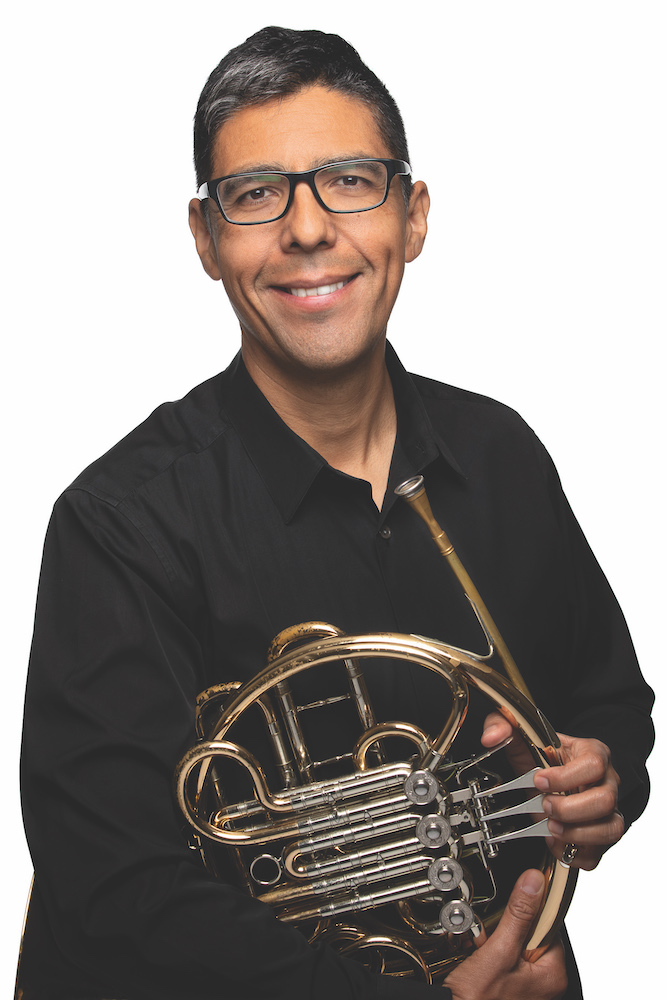With a Musician’s Ear, Armando Castellano Steps Aside and Listens

As one of the only Latino students in a big elementary school, a young Armando Castellano was put in a challenging situation.
“It was right after the laws had changed, and they were allowing people of color to move into these neighborhoods,” Castellano says. “I experienced an incredible amount of racism. It really chipped at my self-esteem. But somehow in music class I felt more at ease.”
His experience at school encouraged a lifelong passion for classical music. But it also illustrated the reality of living within the antiquated, racist hierarchies of our country.
As Castellano progressed from a fledgling musician to a professional French horn player, he would continue to see the claws of racism and white supremacy around him. From his philanthropic work in grant funding to his performance in orchestras, the deafening narrative of white power was ever present.
In his remarks, Castellano discusses the implications of working within white-dominant spaces and reflects on the responsibility he holds as a high-visibility, high-net-worth person of color.
Q. I know you are a part of the Castellano Family Foundation, which distributes funds to Latino-led initiatives. How did you and your family come into philanthropy?
A. My parents were lifetime social change activists and organizers in the Latino community in San Jose. They won the lottery 22 years ago and started the foundation to fund the nonprofits they had always supported previously but could now support on a different level.
Q. You are also a founding board member of Donors of Color. Why is it important to you to be involved in this type of work?
A. For me what’s important is empowering the communities that I want to serve. But it’s not really about me. I feel like I live in a bubble because of my wealth, so if you ask about why I do what I do, it is about serving others.
Donors of Color is important to the world because philanthropy and the way we talk about wealth, as well as the way it has too often been distributed, works through the lens of white Eurocentricity. The people in power, the people having conversations control the narrative. So, it is important to have a national organization of philanthropists and high-net-worth individuals that look and sound like me and care about similar things as me to come together and think about how we as a BIPOC community want to do philanthropy and change the narrative.
Q. You started studying music at San Jose City College in 1988, which means you have been involved in the music world for over 34 years. Since you started, a lot has changed in our country, a lot has changed in education. How would you say the landscape of classical music has changed? And how would you say this is related to our evolving conversation on racial equity?
A. I used to say philanthropy and classical music are races to see who can be the least woke. It is slowly, slowly changing. But again, the narratives are controlled – especially in classical music – by white folks, so that’s where the funding is going.
I am the only Latino-advocating organization in classical music in the United States. We’re tiny. We’re nothing. We’re the only one. That’s why just over 1% of professional musicians in orchestras are Latino.
In California, over 50% of the students in public school are Latinos. And yet, when I play in a professional orchestra almost 100% of the time, I’m the only one. It shows something that has not changed since I was 17, when I first played in an orchestra and I was the only one.
There are places that are getting better. For example, I do a lot of public speaking both in philanthropy and classical music. In 2020, for the first time, I used the word “racism” at a conference for classical music. I have been saying racism since I was in college, but I was finally allowed to say that and not have to hide behind the cloak of diversity or social change.
Q. What do you find rewarding about your work?
A. Getting to see change at the highest level when systems are influenced. What I learned as a family member trustee with a corpus is that I wield a lot of power, as opposed to being a staff person. The things I say are heard and trusted by other high-net-worth individuals differently.
Because I am carrying a racial equity narrative, I feel really empowered and honored that I am asked to talk and that I am heard when I speak. But there is a sadness there because there are so many people who speak much more eloquently than me on this issue. It is just that I’m heard because I have money.
Sometimes I’ll bring someone along who I can share that power with. The power of wealth – of having a corpus and a foundation.
Sitting inside my home in Menlo Park, I’m not able to solve any problems really. I don’t live a life where I am seeing struggle near me. Instead, I ask the folks that are experiencing that problem what their ideas for solutions are and use my power to push their narrative forward, not my own. That’s really important to me. It’s not about me and my solutions. It’s about the community that I’m serving, what they say the solutions should be.
That’s why we started the LatinXCEL fund. We listened and we were empowered by asking: Where do community members think the money should go? The LatinXCEL fund is a manifestation of what our grantees say should be done to serve Latino-led nonprofits.
Q. A big theme in your work seems to be the importance of the individual. What would you say on the issue of responsibility? Do you feel you have a responsibility to do this work?
A. It’s a moral obligation. It is my obligation as a high-net-worth individual, as a person of the global majority to carry that narrative and share that power. More than an obligation, it’s a moral imperative to do it. That’s how it feels for me. If I don’t use the privilege that I have and what my parents have given me, what they have built, it feels immoral.
